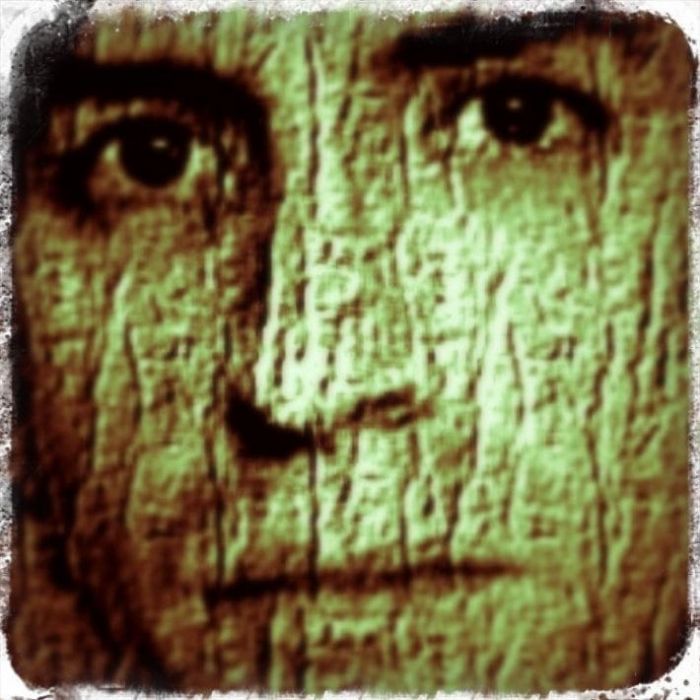Hell’s Laughter and Heaven’s Ache by John Ludi (Review)

At times, I’m reminded of David E. Williams, minus the morose and grotesque characters that populated his songs. However, the wit is still there, a dark wit that’s part satire and part commentary. Ludi, however, is less obtuse than Williams. His lyrics are consistently concerned with modern society, in all of its bleak failings. It’s not a political commentary or rhetoric. No, we’ll save that for the Zack De La Rochas and Chuck Ds of the world. Ludi’s commentary is far more, dare I say, esoteric and spiritual than that. Or, as Ludi says in his own words, “a Don Quixote-like crusade against the dumbing-down of our culture.”
At times, it does get a little tedious. One can only take so much righteous indignation at the failure of modern culture before it gets a little preachy. But Ludi does have a point. And he’s certainly a verbose fellow. You’ll know that from the first words of the album: “Discard your faith in the virtues of civilization, for here lie the bleak rewards of decadence and degradation/For the few: opulence, for the rest: subjugation to the capricious whims of a dying nation” (“All Dead Dictators”). Ludi certainly sets a high bar for himself; it’s not easy to support an album full of such statements, but Ludi pulls it off fairly well. And when he moves awy from social ponderings to the age-old love song, it’s not something that you hear every day: “For try as I may, I can’t forget you/And try as I may, I still let you in here where/the angels don’t dare/but the devils swear/and play their secret serenade/keep me up all night and day dreaming of you” (“Secret Serenade”).
I feel compelled to try and comment on many of the songs here, because I honestly don’t find too many artists whose lyrics are interesting enough to merit it. At times, his lyrics get too self-absorbed and, as I said before, preachy to take seriously, especially early on in the album. But the fact that he’s willing to strive so high, and not use easy subject matter for his songs has merit in and of itself. I don’t know of too many artists who would refer to Zen koans (“Hell’s Laughter and Heaven’s Ache”) and follow it up with a very honest “Late Night Argument With God” (which, in its bluntness, reminds me of many of the Psalms).
One song I found interesting, from a theological viewpoint, is “Song of Set,” with an interesting image of Lucifer (or Set, or in Ludi’s words, the “Great Entropic Principal that we have tended to personify and revile as evil”). Some individuals I know might even label it a “satanic” song, but that’s too simple an explanation. Much of Ludi’s songwriting seems concerned with man preoccupied with what Ludi feels are dead systems, be they political, social, or religious. This comes to the forefront on “The Clear Light of Day”; in Ludi’s own words, it’s a “tune about the tendency we have had to place the responsibility for our own flawed behavior on a vaguely-defined supernatural entity who may not even exist.”
I’m still pondering some the lyrics on this album. I don’t share many of Ludi’s viewpoints (given my beliefs), but I’m always appreciative of lyrics that display intelligence and thought. While perusing his website, especially his Recommended Reading section, one sees the wide range of literary influences on Ludi’s music; Gnosticism, Zen Buddhism, paganism, and the paranormal. It makes for an interesting melange that thankfully doesn’t come close to New Age quackery or righteous propaganda.
So what about the music? The Sisters Of Mercy leap to mind, as do more recent purveyors of the darkwave crop like Lycia, and maybe even darker synth-pop like Human Condition. There’s even a bit of new wave à la Tears For Fears thrown in there. But it’s still rough around the edges. The programmed drums get a little tiresome after awhile, and the production values of the recording are a little lacking. If Ludi stripped down his sound more, I think he’d come quite close to Death In June, Sol Invictus, Fire And Ice, and whatnot. Conversely, a few more orchestral flourishes might find him facing comparisons to the likes of David Sylvian.
It’s easy to see Ludi’s writings as a tad pedantic. Who doesn’t know that modern society is seriously effed up? One look at Fox’s upcoming programming schedule will tell you that. Reading the press sheet he sent, it seemed like he’s got a bit of aggression to work out (much of it was a rant against the modern entertainment industry, mega-corporations, and whatnot). But listening to the CD over and over, you have admire his guts. If not for his social stances, then at least for setting a high bar for himself personally. He may not always reach it, but it does pique my curiosity as to what the next release holds.